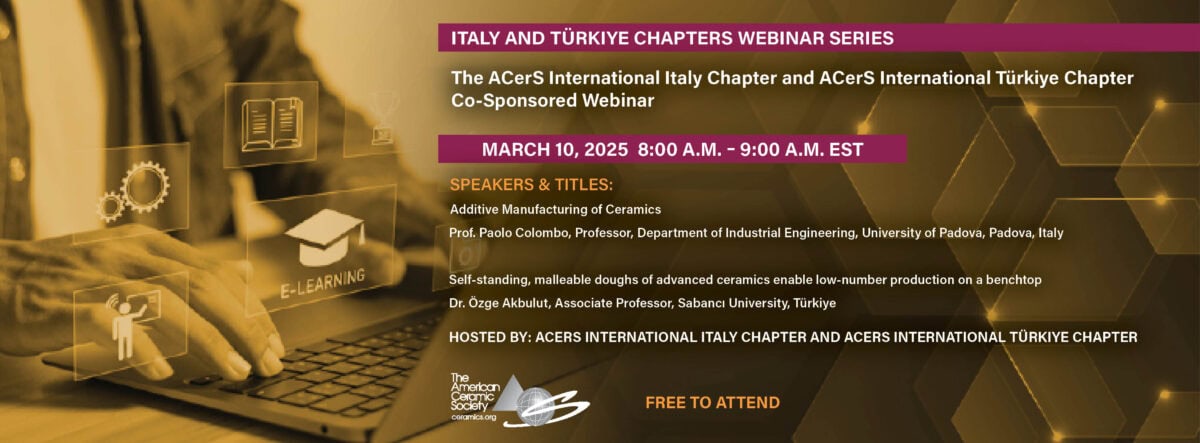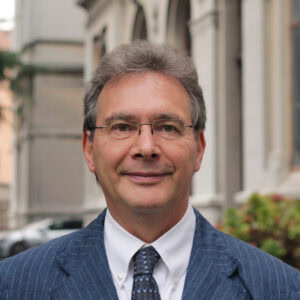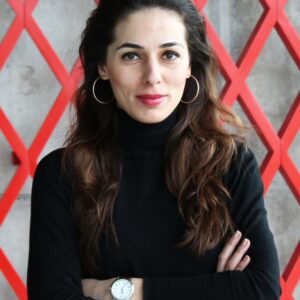Webinar Description

Hosted by: ACerS International Italy Chapter and ACerS International Türkiye Chapter
Monday, March 10, 2025; 9:00a.m. – 10:00a.m. Eastern US time
Sponsored by the ACerS International Italy Chapter and ACerS International Türkiye Chapter, the March webinar will feature two speakers:
Additive Manufacturing of Ceramics and Self-standing, malleable doughs of advanced ceramics enable low-number production on a benchtop
DESCRIPTION
Additive Manufacturing of Ceramics
Additive manufacturing (AM) is a technology which has the potential not only to change the way of conventional industrial manufacturing processes, adding material instead of subtracting, but also to create entirely new production and business strategies. Currently, it is possible to manufacture ceramic components with a very wide range of compositions in a size ranging from the sub-micron to the meter and beyond.
This talk will discuss some of the various fabrication methods that have been developed for the production of ceramic components using AM, for use in a variety of engineering applications.
A critical assessment of the main features of the different technologies will be provided, as well as an overview of issues and benefits that derive from their implementation.
Self-standing, malleable doughs of advanced ceramics enable low-number production on a benchtop
In product design, when we need long-term use, high thermal stability, high strength, and resistance to chemicals, we usually end up in a materials selection region that is covered by ceramics. On the other hand, these properties that single out ceramics for “extreme applications” are obstacles to conventional manufacturing methods, and most of the time, the uncomfortable outcome is settling for either a sub-optimal material or shape. At present, we do not have cost- and energy-effective, standard processing routes for ceramics that utilize current setups for rapid prototyping, and manufacturing in low numbers. There is a clear need for alternative methods that are specifically designed for ceramics.
We generate self-standing doughs of advanced ceramics that can be shaped by hand, and via traditional and laser machining at the green state. We design particle-specific polymeric additives that homogeneously coagulate ceramic suspensions through polymer bridging, imparting a clay-like rheology to the suspensions of zirconia, alumina, magnesia, and many other technologically relevant ceramic systems. Starting from a self-standing structure that can withstand machining forces enables the exploitation of existing setups for machining of metals. The additive content in these formulations is less than 2 wt. %; the formulation can be reused, and the products reach >98% of the theoretical density after sintering. Recently, we have expanded our materials portfolio to nitrides (SiAlONs, more specifically), and our preliminary results on carbides and metals are promising. Large-scale imprinting and injection molding are also applicable. This “no-material leak” route offers an unprecedented, cost-effective scheme for prototyping and low-number production of ceramics.
BIOGRAPHIES

Prof. Paolo Colombo, Professor, Department of Industrial Engineering, University of Padova, Padova, Italy
Paolo Colombo is a professor of Materials Science and Technology at the Department of Industrial Engineering, University of Padova, Padova, Italy. He graduated from the University of Padova with a degree in chemical engineering in 1985 and a diploma in Glass Engineering in 1988. He was an assistant professor at the University of Padova from 1990 to 1998 and then an associate professor at the University of Bologna, until 2005.
He is also an adjunct professor of Materials Science and Engineering at the Pennsylvania State University, and an honorary professor in the Department of Mechanical Engineering of University College London, UK. He was a Foreign Scientist at INSA, Lyon, France in 2015, a DGF Mercator Professor at the Technical University Bergakademie Freiberg, Germany in 2016, an Academic Advisor at the Institute for Advanced Ceramics, School of Materials Science and Engineering, Harbin Institute of Technology, China in 2022/23 and in 2025, and a Visiting Professor at the University of São Paulo, Brazil in 2024.
He was elected Academician of the World Academy of Ceramics (2006), Academician of the European Academy of Sciences (2016), Academician of the Academia Europaea (2024), Academician of the Italian Academy of Engineering and Technology (2024), Fellow of the American Ceramic Society (2010), Fellow of the Institute of Materials, Minerals and Mining (2011), Fellow of the European Ceramic Society (2017). He was awarded a Fulbright Scholarship for the Pennsylvania State University in 1991, the Pfeil Award (The Institute of Materials, Minerals and Mining, London, UK) in 2007, the Global Star Award (The Engineering Ceramics Division of the American Ceramic Society) in 2010, the Edward C. Henry Award (The Electronics Division of The American Ceramic Society) in 2011, the Verulam Medal & Prize (The Institute of Materials, Minerals and Mining, London, UK) in 2013, the Global Ambassador Award (The American Ceramic Society) in 2016, the Polish Ceramic Society Award in 2019, the Bridge Building Award (The Engineering Ceramics Division of the American Ceramic Society) in 2023, and the ECerS-ACerS Joint Award (European Ceramic Society-American Ceramic Society) in 2024.
He is Past President of the International Ceramic Federation (ICF) (2022-2024) and Vice President of the Italian Ceramic Society (2024-2026). He is also a member of the JECS Trust, an officer of the Materials Science Division of the European Academy of Sciences, a member of the EPSRC Peer Review College, and is serving in several committees in International Societies.
He published more than 360 papers in peer-reviewed journals, 9 book chapters and holds 10 international patents. h index (accessed 20/12/2024): Google Scholar = 80; Citations = 24772; Scopus = 70; Citations = 18884; WOS = 65; Citations = 15654. He is co-editor of a book on cellular ceramics, a book on polymer-derived-ceramics, 11 proceedings books and guest editor of 10 Special issues in international scientific journals. He is Editor-in-Chief of Open Ceramics (Elsevier), and is on the editorial board of 10 international scientific journals has co-organized several international conferences, and has given numerous invited talks in the field of porous ceramics, polymer-derived-ceramics and additive manufacturing of ceramics. He was chair of the XVI conference of the European Ceramic Society (Turin, Italy, 16-20/6/2019) and is chair of the Shaping X conference (Padova, 20-23/9/2026).
Paolo Colombo’s research interests include novel processing routes to architected glasses and ceramics (currently focusing mainly on Additive Manufacturing, using different technologies), the development of ceramic components from preceramic polymers and geopolymers, and the upcycling of industrial and natural waste.

Dr. Özge Akbulut, Associate Professor, Sabancı University, Türkiye
Ozge Akbulut is a faculty member at Sabancı University since 2012. She received her B.S. in Materials Science and Engineering at Sabancı University in 2004. Her PhD from Massachusetts Institute of Technology (2009) focused on cost-effective fabrication of biomolecular devices and surface science. She continued her studies as a post-doctoral fellow at Harvard University, (2009–2011) on developing tools/techniques for resource-limited settings. Her main research interests are silicone-based composites and additive/subtractive manufacturing of ceramics. She is the co-founder and CEO of Surgitate which designs and fabricates tactile surgical training platforms, since 2014. Starting from 2023, Dr. Akbulut also acts as a Chief Science Officer at Fark Labs—an innovation and transformation hub in the entrepreneurship ecosystem.
REGISTRATION
If you have any questions, please contact Vicki Evans.
This webinar is brought to you by the ACerS International Italy Chapter and ACerS International Türkiye Chapter.
To view past ACerS webinars click here.
Prof. Paolo Colombo, Professor, Department of Industrial Engineering, University of Padova, Padova, Italy
Paolo Colombo is a professor of Materials Science and Technology at the Department of Industrial Engineering, University of Padova, Padova, Italy. He graduated from the University of Padova with a degree in chemical engineering in 1985 and a diploma in Glass Engineering in 1988. He was an assistant professor at the University of Padova from 1990 to 1998 and then an associate professor at the University of Bologna, until 2005.
He is also an adjunct professor of Materials Science and Engineering at the Pennsylvania State University, and an honorary professor in the Department of Mechanical Engineering of University College London, UK. He was a Foreign Scientist at INSA, Lyon, France in 2015, a DGF Mercator Professor at the Technical University Bergakademie Freiberg, Germany in 2016, an Academic Advisor at the Institute for Advanced Ceramics, School of Materials Science and Engineering, Harbin Institute of Technology, China in 2022/23 and in 2025, and a Visiting Professor at the University of São Paulo, Brazil in 2024.
He was elected Academician of the World Academy of Ceramics (2006), Academician of the European Academy of Sciences (2016), Academician of the Academia Europaea (2024), Academician of the Italian Academy of Engineering and Technology (2024), Fellow of the American Ceramic Society (2010), Fellow of the Institute of Materials, Minerals and Mining (2011), Fellow of the European Ceramic Society (2017). He was awarded a Fulbright Scholarship for the Pennsylvania State University in 1991, the Pfeil Award (The Institute of Materials, Minerals and Mining, London, UK) in 2007, the Global Star Award (The Engineering Ceramics Division of the American Ceramic Society) in 2010, the Edward C. Henry Award (The Electronics Division of The American Ceramic Society) in 2011, the Verulam Medal & Prize (The Institute of Materials, Minerals and Mining, London, UK) in 2013, the Global Ambassador Award (The American Ceramic Society) in 2016, the Polish Ceramic Society Award in 2019, the Bridge Building Award (The Engineering Ceramics Division of the American Ceramic Society) in 2023, and the ECerS-ACerS Joint Award (European Ceramic Society-American Ceramic Society) in 2024.
He is Past President of the International Ceramic Federation (ICF) (2022-2024) and Vice President of the Italian Ceramic Society (2024-2026). He is also a member of the JECS Trust, an officer of the Materials Science Division of the European Academy of Sciences, a member of the EPSRC Peer Review College, and is serving in several committees in International Societies.
He published more than 360 papers in peer-reviewed journals, 9 book chapters and holds 10 international patents. h index (accessed 20/12/2024): Google Scholar = 80; Citations = 24772; Scopus = 70; Citations = 18884; WOS = 65; Citations = 15654. He is co-editor of a book on cellular ceramics, a book on polymer-derived-ceramics, 11 proceedings books and guest editor of 10 Special issues in international scientific journals. He is Editor-in-Chief of Open Ceramics (Elsevier), and is on the editorial board of 10 international scientific journals has co-organized several international conferences, and has given numerous invited talks in the field of porous ceramics, polymer-derived-ceramics and additive manufacturing of ceramics. He was chair of the XVI conference of the European Ceramic Society (Turin, Italy, 16-20/6/2019) and is chair of the Shaping X conference (Padova, 20-23/9/2026).
Paolo Colombo’s research interests include novel processing routes to architected glasses and ceramics (currently focusing mainly on Additive Manufacturing, using different technologies), the development of ceramic components from preceramic polymers and geopolymers, and the upcycling of industrial and natural waste.

Dr. Özge Akbulut, Associate Professor, Sabancı University, Türkiye
Ozge Akbulut is a faculty member at Sabancı University since 2012. She received her B.S. in Materials Science and Engineering at Sabancı University in 2004. Her PhD from Massachusetts Institute of Technology (2009) focused on cost-effective fabrication of biomolecular devices and surface science. She continued her studies as a post-doctoral fellow at Harvard University, (2009–2011) on developing tools/techniques for resource-limited settings. Her main research interests are silicone-based composites and additive/subtractive manufacturing of ceramics. She is the co-founder and CEO of Surgitate which designs and fabricates tactile surgical training platforms, since 2014. Starting from 2023, Dr. Akbulut also acts as a Chief Science Officer at Fark Labs—an innovation and transformation hub in the entrepreneurship ecosystem.
REGISTRATION
If you have any questions, please contact Vicki Evans.
This webinar is brought to you by the ACerS International Italy Chapter and ACerS International Türkiye Chapter.
To view past ACerS webinars click here.
